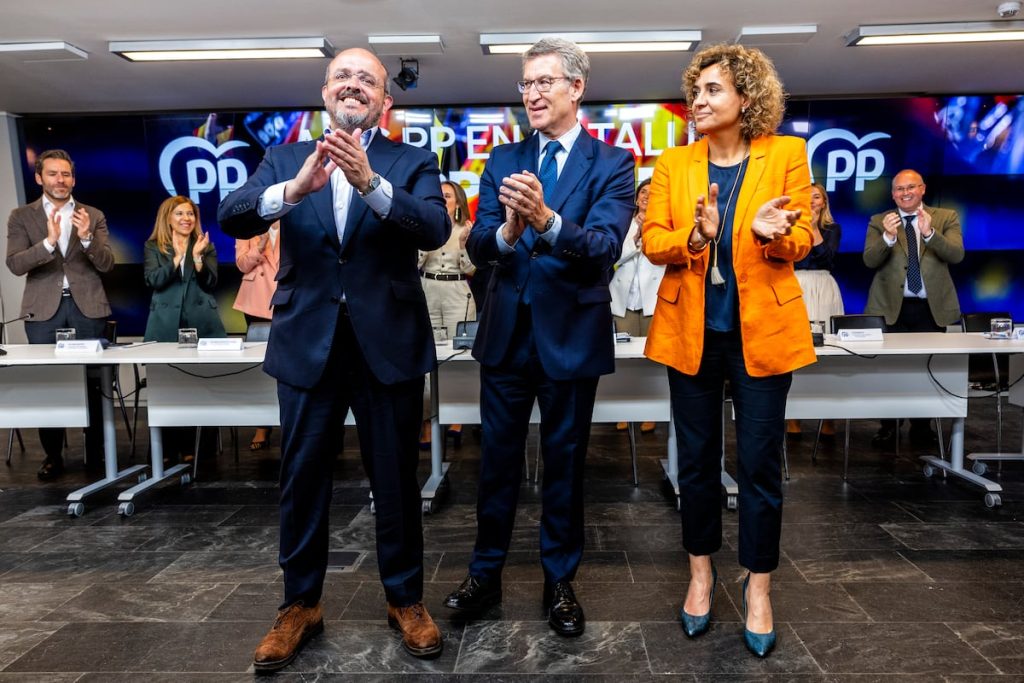The President of the Catalan PP, Alejandro Fernández, along with the leader of the PP, Alberto Núñez Feijóo, and the candidate for the European Parliament, Dolors Montserrat, recently attended the last National Executive Committee meeting of the Popular Party. Despite the significant improvement in results for the PP’s candidacy in the Catalan elections, increasing from three to fifteen seats with seven percentage points more of the vote (up to 11%), the national leadership of the PP attributes this success to collective work rather than solely to the candidate. There are lingering doubts within the national leadership about Fernández, despite his strengthened position in the elections. As a result, the national leadership is in no rush to hold the PP congress in Catalonia, postponing it until after the European elections. The confirmation of Fernández as the next leader is also uncertain, as he has not revealed whether he will compete for the organic leadership position with the legitimacy of his electoral success.
The congress of the Catalan PP will not take place “before this summer”, according to sources from the national leadership, who also refuse to endorse Fernández as the next party president, stating that this discussion is not relevant at the moment. The delay in holding the congress suggests that Catalonia is the only internal conflict within the PP that Feijóo has not yet managed to resolve. When the congress does eventually take place, the PP leader will be elected through primaries. However, there are concerns within the national leadership that Fernández may not have the support of all party sectors, such as the PP of Barcelona led by Manu Reyes, one of his main internal adversaries. The success in the Catalan elections is attributed to the intervention in Fernández’s candidate list, which included representatives from all sectors, uniting the party during the campaign. Therefore, the national leadership remains skeptical about Fernández’s leadership. Whether he will ultimately be accepted as the leader remains to be seen, as was the case in the Catalan elections where Fernández prevailed over the national leadership.
Fernández is keeping his cards close to his chest for the time being. Sources close to him state that he will not speak about the congress “until it is convened”, leaving all options open, including the possibility of running for leadership. Some key figures within the Catalan PP have no doubt that he will, putting Feijóo in a difficult position. Before the elections, the leadership’s plan was to appoint Dolors Montserrat as party leader, given her role as head of the party’s list for the European Parliament, with a close Secretary General, potentially Santi Rodríguez, in a full-time role. However, Fernández’s strengthened position following the elections could disrupt this plan. The spokesperson for the PP, Borja Sémper, avoided confirming whether Fernández has the support of the leadership to lead the Catalan PP, and also did not confirm when the congress would be held.
The PP in Catalonia is also facing another significant debate regarding its role in the Catalan investiture process, particularly if the PSC candidate, Salvador Illa, is able to present himself. Both Fernández and the national leadership of the PP have rejected supporting Illa until Prime Minister Sánchez stops his agreements with Puigdemont in Madrid. Feijóo even suggests that Sánchez will ultimately make the candidate from Junts the president, despite PSC winning the elections and Illa seeking alliances. While the PP’s votes may not be decisive initially, they could become crucial depending on the actions of other parties. Overall, the uncertainty surrounding Fernández’s leadership, combined with the party’s stance on the investiture process in Catalonia, poses challenges for the PP as it navigates its internal and external dynamics.


